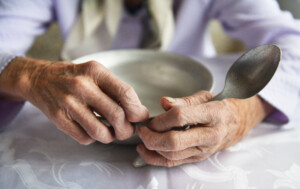 My favorite part of the story of Moses and the exodus from Egypt is when the Children of Israel, once they are free from their suffering under Pharaoh, have been traveling seemingly in circles in the desert just long enough—about 45 days—to get anxious about whether they would have enough food and the prospect of starvation in the desert. Anxious, they grumble. Louder and louder. Their anxiety spreads, even to Moses, who wisely takes their grumbling (and quite a bit of his own) to God in a complaint. As I read between the lines, it is pretty clear that the people are not actually hungry at this point, only anxious, worried about becoming hungry. It is not their tummies grumbling and making the noise as much as it is their fretful minds. Nonetheless, Yahweh hears their complaints and gives them what they need. Water springs from rocks and they receive food to eat as if by magic: quail in the evening, manna or bread in the morning for breakfast.
My favorite part of the story of Moses and the exodus from Egypt is when the Children of Israel, once they are free from their suffering under Pharaoh, have been traveling seemingly in circles in the desert just long enough—about 45 days—to get anxious about whether they would have enough food and the prospect of starvation in the desert. Anxious, they grumble. Louder and louder. Their anxiety spreads, even to Moses, who wisely takes their grumbling (and quite a bit of his own) to God in a complaint. As I read between the lines, it is pretty clear that the people are not actually hungry at this point, only anxious, worried about becoming hungry. It is not their tummies grumbling and making the noise as much as it is their fretful minds. Nonetheless, Yahweh hears their complaints and gives them what they need. Water springs from rocks and they receive food to eat as if by magic: quail in the evening, manna or bread in the morning for breakfast.
Even if you have forgotten (or haven’t read) the story, you probably know what happens next. After a little while, the Israelites got bored with quail and manna, so they started to grumble and complain about that. This cycle (OUR GRUMBLING—GOD’S GIVING—OUR GRUMBLING) was the origin of the liturgical expression, “As it was in the beginning, is now, and ever shall be.”[1] For we do the same thing today! Even though most of us do not really know what hunger is, that does not stop us from becoming anxious and afraid. Our anxiety about the dangers and deprivations we imagine in the wilderness areas of life is what we express through the excesses of our appetites and longings for safety and security.
Naturally, physical food and water are among the basic, fundamental necessities of life. This explains why symbolic food and water have extraordinary power as metaphors. From the concrete and literal to the spiritual and sublime, they are potent symbols, as our biblical stories illustrate and Jesus manifests as “the bread of life” and the source of “living water.” To give and share food and water with another is to grant the power of life to continue, grow, and flourish. To be separated from such nutrition is to wither and die, being separated from the source and sustenance of life. In the Exodus desert wilderness, Moses knew that this power belonged to Yahweh. But today, we might recognize that whoever holds power to share or to withhold “bread” and “water,” in a real sense, holds a god-like power. Jesus manifested this power as endlessly, self-giving love. “The thief comes only to steal and kill and destroy,” he draws an important distinction, “I came that they may have life, and have it abundantly” (John 10:10).
Sometimes—no, all the time, really—this describes the position many of us are in today. We hold a bit of god-like power to share what we have in order to “feed” others, literally or metaphorically. Whether we are aware of it or not, we wield this power in the choices we make, minute by minute, day by day, year by year until our last breathing moment on earth. Are we givers or withholders? Do we dare share what we have or anxiously cling to our excess? Stockpile and hoard, or let go and let God? Like it or not, this is our God-like power—or, we become like thieves who withhold and try to take life for ourselves. How we answer these questions says a great deal about one’s faith. How much are we willing to trust the reality and presence of God and God’s promise to feed us what we need, when we need it?
The Episcopal Community Foundation for Middle and North Georgia has a mission providing funding, leadership, and resources to enable Episcopalians to lift up people facing poverty and oppression and to achieve significant, long-lasting change in our communities. I urge you to take a look at the ministries around our Diocese that are supported by the Episcopal Community Foundation, and how many of them work directly to feed the hungry—in both the literal as well as metaphorical ways. Maybe you will see one you would like to support, either financially or be to volunteer in other ways. Try it, and you might feel a bit of god-power flowing through you as you do.
[1] Not really.

